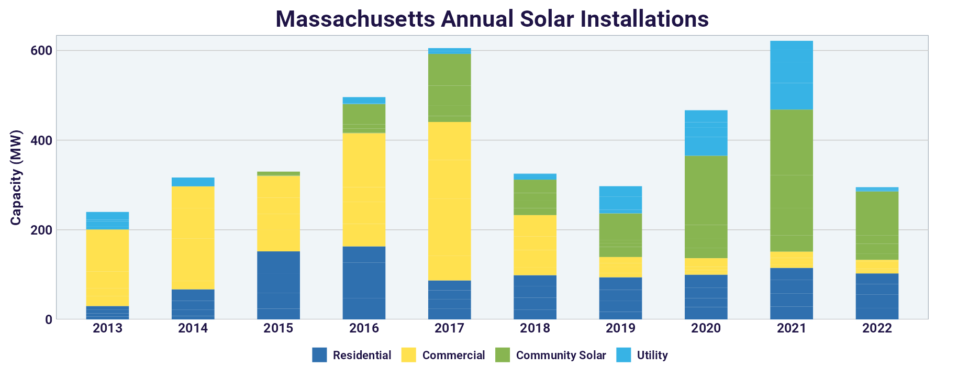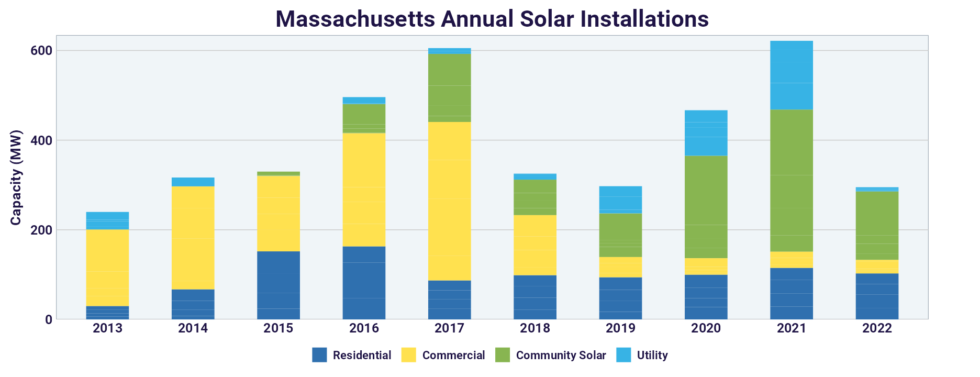
When it comes to residential solar, Massachusetts is making significant strides in the renewable energy landscape. The state’s commitment to clean energy has resulted in remarkable achievements and a thriving solar industry. In this blog post, we dive into the latest statistics and developments surrounding residential solar in Massachusetts, showcasing its impact on the state’s economy and environment.
Massachusetts Solar Industry Ranks 11th Nationally with 4,236 MW Installed
Massachusetts continues to shine as a solar leader, securing the 11th position nationally with an impressive 4,236 MW of installed solar capacity. This marks a substantial jump from its 15th ranking in 2022, reflecting the state’s commitment to sustainable energy solutions.
Powering Nearly 740,000 Homes: Massachusetts’ Solar Impact
The impact of residential solar in Massachusetts is undeniable. With enough solar installed to power approximately 739,908 homes, the state is significantly reducing its reliance on traditional energy sources and embracing clean, renewable power. Solar energy now accounts for an impressive 20.25% of the state’s electricity generation, further solidifying its role in Massachusetts’ energy mix.
Solar Jobs and Investment: Driving Economic Growth in the State
The solar industry in Massachusetts is not only environmentally beneficial but also a powerful economic driver. With 10,548 solar jobs and 502 solar companies operating within the state, Massachusetts is fostering employment opportunities and attracting investments. To date, the total solar investment in the state stands at an impressive $9.6 billion, demonstrating the significant economic potential of the solar sector.
Massachusetts’ Solar Growth Projection: 1,815 MW in the Next 5 Years
The future of residential solar in Massachusetts looks bright. With a projected growth of 1,815 MW over the next five years, the state is poised to further strengthen its position as a solar leader. The Mass Solar Initiative is supporting this growth through education and information for area homeowners. This growth projection, though ranking 28th nationally, showcases the continued commitment to expanding renewable energy sources.
Policy Highlights: Expanding the SMART Program and Advancing Solar Interconnection
Massachusetts has implemented key policies that have propelled its solar industry forward. The Solar Massachusetts Renewable Target (SMART) program, established in 2018, has been instrumental in driving significant solar deployment in the state. Moreover, the state’s net metering and renewable portfolio standard, complemented by the Solar Renewable Energy Credit (SREC) market, have shaped the Massachusetts solar market.
Additionally, recent policy highlights include expanding the SMART program to accommodate an additional 1,600 MW of capacity, relaxing restrictions on solar project development, and supporting improved distributed solar interconnection policies.
Massachusetts Stands as a Model for Other States
The remarkable growth of residential solar in Massachusetts showcases the state’s commitment to clean energy and sustainability. With a thriving solar industry, significant job creation, and a substantial investment in solar projects, Massachusetts is paving the way for a greener future. As policies evolve and solar adoption continues to rise, Massachusetts stands as a model for other states to follow in their pursuit of renewable energy solutions.


